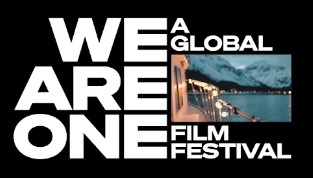“We Are One: A Global Film Festival”
Good news for fans of festival films! The film festival organizers around the world won’t let the coronavirus pandemic stop their events. They decide to create a 10-days online film festival called “We Are One: A Global Film Festival”. “We Are One” starts from May 29th- June 7th, 2020. The audience can stream this festival on www.youtube.com/weareone. Films are also available on VOD (Video on Demand) during the festival.
The participants of “We Are One” are various film festivals across the world, such as Cannes Film Festival, Tribeca Film Festival, Sundance Film Festival, Berlin International Film Festival, Venice Film Festival, Guadalajara International Film Festival, International Film Festival & Awards Macao (IFFAM), Jerusalem Film Festival, Mumbai Film Festival (MAMI), Tokyo International Film Festival, Toronto International Film Festival, and many others.
More than 100 films are screening on this festival, including movie premiere, animation, documentary, short film, and 360˚ VR. The genre ranges from drama, history, comedy, action, adventure, music documentary to mystery. “We Are One” is not just covering films but also talks with several directors, producers, actresses and actors, such as Guillermo del Toro, Tessa Thomson, Jane Campion, Alejandro Iñárritu, Marina Ambramović, Francis Ford Coppola, Jackie Chan, Zhang Ziyi and so on.
The “We Are One” festival is not only a celebration of films but also an effort to raise funds for COVID-19 relief. It does not only provide entertainment but also chance for the audience to donate for COVID-19 relief.
All films and programs are free during fundraising time. Almost all films can be watched even after the first screening. Only few certain films will not remain online after the screening.
I have watched some of the films in this online festival. For me, watching festival films has never been like this. I can bring the film festival to my home and watch it from cozy couch together with my family. The most impressive film for me is “And Then The Bear”, a surrealist animation film, by Agnès Patron (director and screenwriter). It tells about a child who has a soul as a wild bear. This film shows the burning house, a desperate couple, a brave child and wild bears’ dance. It reminds me of children who became victims of violence in their family.
In my opinion, this festival also opens the confinement of good films that it usually can be enjoyed on the festival only. Now, they bring it to a wider space of spectacle. I am really glad that I can access such good films during this pandemic time.
The Democratizing Power of New Media
“We Are One: A Global Film Festival” is one of the examples of how ‘new media’ has power to democratizing both media itself and society.
But, what is the ‘new media’? In “New Media, a Critical Introduction” (2003), Martin Lister, et.al, explain that ‘New Media” is an inclusive term. ‘New Media’ does not only refer to new technology like ‘digital’ or ‘electronic media’, but is also marked by other characteristics, such as interactive, hypertextual, virtual, networked, and simulated.
According to Beata Rozumilowicz, in a book “Media Reform, Democratizing Media, Democratizing Society” (2004), democracy can be understood as institutionalized diffusion of political power in a society and increasing of agents’ participation to this deliberative process. Media can contribute to the development of democratic political order and fair economic structures by provides greater information to the public.
‘New Media’ has potential ability to support deliberative process in media and society as well. Its digital, interactive, and networked characteristics can enhance the possibility of political power diffusion both in media and society.
Firstly, ‘We Are One: A Global Film Festival’ has the power to break barriers and domination in media. In this festival, there is no center, major, or domination among the film festival participants. They are equal, regardless of where they come from and how long their tradition is. It also increases the possibility of the local film being accessed by wider audience. It recalls the winning of “Parasite” by Bong Joon-ho (Director) in the Cannes Film Festival that paves path to their winning of Oscar. It has shifted the attention of the film-world from English speaking countries to Asia film.
Secondly, this festival has potential power to spread the call for justice, equality, and better respect for human rights. As Eamon Gilmore said in his article “Democratisation and New Media” (2012), the new media is “an effective and transformational part of democratization tool-kit”. Through the digital platform, this festival can transform social awareness of the audience and increase individual participation to build a democratic society. As Youtube is used as platform for this festival, the audience can write their commentary and make a discussion on every film page, something that cannot be done in offline system. It also allows the audience to exercise their freedom of expression that is significant for the construction of more democratic societies.

